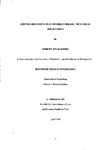EMOTION PROCESSING IN ALZHEIMER'S DISEASE: THE CLINICAL IMPLICATIONS
| dc.contributor.author | RADFORD, SHIRLEY ANN | |
| dc.contributor.other | School of Psychology | en_US |
| dc.date.accessioned | 2013-11-14T12:04:35Z | |
| dc.date.available | 2013-11-14T12:04:35Z | |
| dc.date.issued | 1999 | |
| dc.identifier | NOT AVAILABLE | en_US |
| dc.identifier.uri | http://hdl.handle.net/10026.1/2719 | |
| dc.description.abstract |
The purpose of this study is to extend the literature on recognition and identification of non-verbal communicative signals of emotion in those suffering from Alzheimer's disease. To date, there have been few studies in this area, yet emotion processing deficits may have an important effect on the quality of life of Alzheimer's patients and their families. The experimental condition consisted of a set of tasks involving face and prosody discrimination problems in which participants were asked to choose between a number of stimuli presented on cards (facial cues) or on audio-tape (prosody cues). In addition, a measure of general cognitive ability was taken. Firstly, it was found that, relative to a group of healthy older adults, performance on cognitive tasks was depressed, while performance on emotion processing tasks was not depressed to the same extent. Thus, the ability to recognise and identity non-verbal affect cues in emotional facial expression and emotional prosody was relatively preserved in patients with Alzheimer's disease. Secondly, no relationship was found in the Alzheimer disease group between performance on face recognition and prosody tasks. This evidence is consistent with the notion that the mechanisms responsible for discriminating emotional facial expression are dissociated from those involved in discriminating emotional prosody. However, these findings need to be interpreted with caution in view of the small sample size and low statistical power. Lastly, a number of post-study hypotheses were generated in relation to the Alzheimer disease group. These related to the number and type of errors made on tasks of face and prosody discrimination and suggestions were made regarding further investigation in this area. Finally, limitations of the study, implications for clinical practice, such as assessment and intervention focussing on preserved emotion processing ability and suggestions for future research are considered. | en_US |
| dc.description.sponsorship | The BRACE Centre Memory Clinic and Franchay Healthcare Trust | en_US |
| dc.language.iso | en | en_US |
| dc.publisher | University of Plymouth | en_US |
| dc.title | EMOTION PROCESSING IN ALZHEIMER'S DISEASE: THE CLINICAL IMPLICATIONS | en_US |
| dc.type | Thesis | |
| plymouth.version | Full version | en_US |
| dc.identifier.doi | http://dx.doi.org/10.24382/4361 | |
| dc.identifier.doi | http://dx.doi.org/10.24382/4361 |
Files in this item
This item appears in the following Collection(s)
-
01 Research Theses Main Collection
Research Theses Main


